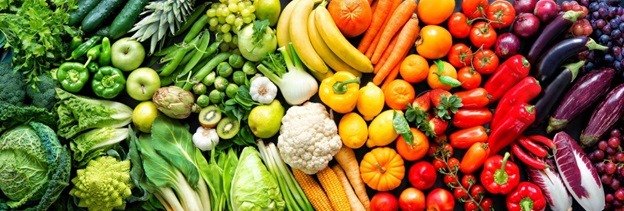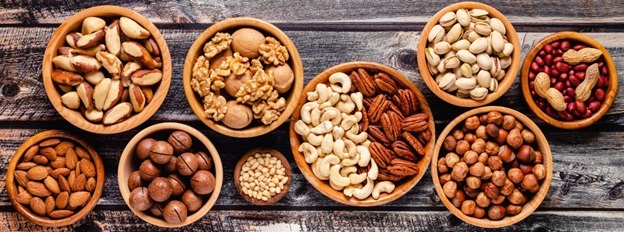Today, an enormous amount of nutrition information is available, and many people find it confusing to navigate. Moreover, many sources have different views, which complicates the planning of a healthy diet. In this article, we’ve put together 18 science-backed nutrition tips to help you lead a healthy lifestyle and raise longevity.
The Best Healthy Food Choices
Good nutrition is an essential part of our health and longevity. According to the WHO, proper nutrition is directly related to improved health and reduced risks of diseases at all ages. To date, a range of leading healthcare companies offer biological age testing to determine how old your body is, in contrast with your calendar age. These tests allow you to establish a health baseline so you can measure whether your lifestyle and treatments are actually reversing ageing. They can also help set the vector of further lifestyle changes to improve the results obtained.
Following the nutrition tips below will help you get the most out of your diet and enrich it with nutrients that improve your overall health.
Eat Whole Grains
Whole grains contain a range of nutrients, such as iron, group B vitamins and fibre. All of them are essential for regulating the functioning of the immune system, carrying oxygen in the blood and balancing blood glucose levels. According to the American Heart Association, eating whole grains is beneficial for our health as they:
- Are good sources of dietary fibre;
- Improve blood cholesterol levels;
- Reduce the risk of obesity, type 2 diabetes, heart disease and stroke;
- Can help you feel full, making you satisfied with fewer calories;
- Provide nutrients like selenium, magnesium and B vitamins that are important for forming new cells and regulating thyroid function.
Common whole grain foods include quinoa, brown rice, oats, corn, farro, barley, oatmeal and graham flour.
Eat a “Rainbow”
The saying “Eat a rainbow” may sound strange, although it helps easily remind people to include colourful fruits and vegetables in their diet. Different colours of plant foods mean you get a wide variety of antioxidants like anthocyanins and carotenoids that are highly beneficial to health. You can take c60 supplement if you want a powerful antioxidant that maximizes the cell’s energy efficiency and provides you with utmost protection against toxic environmental factors. Also, incorporating Orthomolecular supplements into your diet can help provide essential nutrients and vitamins, supporting optimal health and well-being.
Include Protein In Every Meal
Including protein in your diet can help balance blood glucose and reduce the risk of heart disease, stroke and type 2 diabetes. Balancing blood sugar can also support weight management.
Eat Healthy Fats
Omega-3 fatty acids contained in oily fish like salmon are vital for our brain development, eye health, cell signalling and gene expression. Regular intake of these fatty acids reduces the risk of cardiovascular disease, slows the development of plaque in the arteries, lowers blood pressure and reduces triglycerides. Additionally, the anti-inflammatory properties of these fatty acids may effectively manage the early stage of degenerative diseases like Parkinson’s and Alzheimer’s.
Besides fatty fish, you can consume healthful fats from vegetable oils, avocado, walnuts, flaxseed, tofu and soymilk.
Choose Extra Virgin Olive Oil
Being a part of the Mediterranean diet, extra virgin olive oil has numerous benefits to heart health, blood pressure and weight. You can add olive oil to salads and vegetables or use it for cooking food at low temperatures.
Get Enough Fibre
According to the American Heart Association, fibre lowers the risk of obesity, heart disease and type 2 diabetes and helps improve blood cholesterol levels. You can get enough fibre in your diet by eating whole grains, beans and vegetables.
Eat Nuts
The American Heart Association states that substituting dessert, red or processed meat or french fries with one serving of nuts daily may significantly benefit health and prevent weight gain. Nuts also may help you feel fuller and stabilise your blood glucose levels.
Try Beans
Beans are an excellent source of protein and can be a good choice for people on a plant-based diet to substitute meat. However, those who eat meat can also include them in their diet and eat beans on a few meat-free days a week. Beans may also help you feel fuller and lose weight.
Eat More Plant Foods
A plant-based diet may help prevent obesity and all the diseases associated with it. According to one 2017 review published in the Journal of Geriatric Cardiology, including more plant foods in the diet could also reduce the risk of cardiovascular disease and type 2 diabetes.
Eat Greens
According to the Department of Agriculture, dark green leafy vegetables are an excellent source of nutrition as they are rich in vitamins, antioxidants and minerals. Research also suggests that folate in leafy greens may help protect against cancer, while vitamin K is believed to be beneficial in preventing osteoporosis.
The Best Healthy Drinks Choices
Drinking healthy beverages also has numerous health benefits. Look at our nutrition tips for what to drink to stay healthy and live longer.
Enjoy Coffee
According to numerous studies, coffee offers a range of benefits for our health. Among the most impressive ones are:
- Reduces the risk of developing dementia, Alzheimer’s and Parkinson’s diseases, and overall cognitive decline;
- It is beneficial for weight management. Higher coffee consumption is associated with decreased body fat and better physical activity, which also promotes managing a healthy weight;
- Coffee reduces the risk of depression;
- It could protect against liver diseases like liver scarring and liver cancer. According to one 2017 review article published in the World Journal of Hepatology, regular coffee consumption can also reduce the risk of death from chronic liver disease by 71%.
- Coffee supports cardiovascular health;
- According to a 2019 meta-analysis published in the European Journal of Epidemiology, it increases longevity regardless of age, weight and alcohol consumption. Moreover, drinking at least one cup of coffee per day is also associated with a lower risk of death from cancer.
Don’t Forget About Water
According to the CDC, drinking enough water every day is good for the health and can help manage body weight. Regular water consumption can also prevent dehydration, which is especially important for older adults. The recommended daily amount of water is 30 ml per kg of weight. If you don’t like plain water, you can add some citrus slices or mint leaves to increase the appeal or substitute water with herbal teas.
Drink Herbal Tea
According to a 2017 study published in the PeerJ Journal of Life and Environmental Sciences, catechins contained in green, black and other herbal teas have antimicrobial properties and can stimulate brain function, boost the immune system, reduce pain and soreness, improve the digestive system functioning, and reduce the risk of chronic diseases. Herbal teas, such as mint, rooibos, and chamomile, are caffeine- and calorie-free and help you stay hydrated throughout the day.
Foods And Drinks to Avoid
Avoid Sugary Drinks
Frequent consumption of sugary drinks is often associated with diseases like:
- Kidney disease;
- Heart disease;
- Obesity;
- Type 2 diabetes;
- Non-alcoholic liver disease;
- Gout;
- Tooth decay.
It’s highly recommended to replace sugary drinks with water or maximally limit their consumption if you want to stay healthy.
Eat Less Red Meat
Several studies have found that regularly eating red meat can raise the risk of stroke, type 2 diabetes, heart disease and certain types of cancer. A 2019 study published by The BMJ also found that people who replaced meat with other protein sources, such as eggs, fish and nuts, had a lower risk of death.
Avoid Processed Foods
Frequent consumption of ultra-processed foods is linked with a range of severe health conditions like cancer, high blood pressure, diabetes, irritable bowel syndrome and depression. Try to avoid foods with long lists of processed ingredients and substitute them with whole foods.
Drink Alcohol In Moderation
If you don’t want to cut back on alcohol completely, try to drink it in moderation. Dietary Guidelines for Americans recommend limiting alcohol consumption to one drink a day for women and two drinks a day for men. Excessive drinking can increase the risk of chronic diseases and impair short and long-term cognitive function.
Reduce Sugar
Excessive sugar consumption increases the risk of metabolic syndrome, diabetes, and cardiovascular disease. It may also cause weight gain, acne, cellular ageing, skin ageing and increase the risk of depression. Natural sugars like honey can also contribute to weight gain if consuming them too often.
Final Words
Nutrition is an essential part of our health and one of the main pillars of longevity. You can start leading a healthy life and feel and look great just by making small changes to your diet. Supplement your diet with exercise, good sleep and a positive mood, and your body will function at its highest level for years to come.






